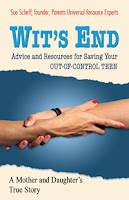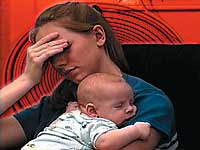
“I knew a little bit about it just from health class, things like that, but nobody in my family had ever really talked to me about it.”
– Amber Schalk, 19
For the first time in 14 years, the number of babies born to teenage parents in the U.S. is up, according to the Centers for Disease Control and Prevention (CDC). What’s behind the increase?
Amber says she had to learn about sex on her own.
“I knew a little bit about it just from health class, things like that. But nobody in my family had ever really talked to me about it,” says Amber Schalk, 19.
Now, Amber is a 19-year-old mother of two.
“What book do you want to read?” Schalk asks her daughter.
“I wasn’t using any protection, because I guess I just thought I wouldn’t get pregnant. I don’t know why, but I did -- eventually it happened,” says Schalk.
According to the CDC, after a steady decline for more than a decade, the teen birth rate rose 3 percent from 2005 to 2006. Some experts fear that what parents and schools teach kids about sex is superficial or incomplete.
“We’re still grappling with the whole idea that somehow if you have knowledge that you’re going to act on it. That is totally wrong. Actually, the more knowledge you have, the less likely you are to engage in sex,” says Gail Wyatt, PhD, clinical psychologist.
She says teens are powerfully curious about sex. That’s why parents need to be open and honest.
“You don’t want to walk away and say, ‘that’s not a good question, I’m not going to talk to you,’ or, ‘you shouldn’t even be thinking about that.’ To shut a conversation down is probably about the worst thing that a parent can do, and to make the teen feel guilty for having asked the question,” says Wyatt.
“Kids wind up getting these answers, but they’re not going to get them from you. They learn to ask their friends,” says Dr. Mark Schuster, M.D., Ph.D., pediatrician.
Schalk says she loves her kids and yet, there is some regret.
“I wish somebody just would have talked to me. Sat down and talked to me about sex and things that were going to happen during my teenage years, but nobody did,” says Schalk.
Tips for Parents
If kids are left to their own devices, they may simply act on their hormones. If they understand their bodies and their hormones, chances are they won’t choose to be sexually active. (Gail Elizabeth Wyatt, Ph.D., clinical psychologist)
Just as we teach our children how to brush their teeth and take care of themselves, parents and educators need to teach children about reproductive health care. It’s a vital part of who we are as healthy human beings. (Michele Ozumba, Georgia Campaign for Adolescent Pregnancy Prevention)
It can be difficult for parents to talk to their teens about sex. One good way to start the conversation is to use teaching moments from television programs, news reports, DVDs, etc.
“One suggested way to open the conversation is to say, ‘Even though I don’t want you to be having sex now, I know that [some] kids do have sex in high school, and whether or not you’re going to, you’re going to have friends who have sex, or classmates, and I think we should talk about this.’” (Mark Schuster, M.D., Ph.D., pediatrician, researcher, author)
When your teens ask about sex, one of the worst things that a parent can do is to shut down a conversation, and make the teen feel guilty for having asked the question. Listen, try not to be judgmental, and provide age-appropriate information. (Gail Elizabeth Wyatt, Ph.D., clinical psychologist)
“Your child may be sitting at the dinner table pretending not to listen, but they’re absorbing every word. They’re very eager to hear what you have to say about this. Actually, when kids are asked who they want to learn about sex from, it’s their parents.” (Mark Schuster, M.D., Ph.D., pediatrician, researcher, author)
“Don’t just talk about sex, talk about love. Share with your kids what’s wonderful about love. Share how sex can fit into a loving, caring relationship. Kids should get all of that from their parents. They shouldn’t just get the part about how body parts fit together; they should get the whole emotional package from their parents.” (Mark Schuster, M.D., Ph.D., pediatrician, researcher, author)
Talking about sex shouldn’t just be a lecture. Listen to what your teen is saying and thinking. They are exposed to much more sexually explicit material than previous generations, and need to separate the truth from the fiction. (Michele Ozumba, Georgia Campaign for Adolescent Pregnancy Prevention)
References
Columbia University
Georgia Campaign for Adolescent Pregnancy Prevention
Guttmacher Institute
– Amber Schalk, 19
For the first time in 14 years, the number of babies born to teenage parents in the U.S. is up, according to the Centers for Disease Control and Prevention (CDC). What’s behind the increase?
Amber says she had to learn about sex on her own.
“I knew a little bit about it just from health class, things like that. But nobody in my family had ever really talked to me about it,” says Amber Schalk, 19.
Now, Amber is a 19-year-old mother of two.
“What book do you want to read?” Schalk asks her daughter.
“I wasn’t using any protection, because I guess I just thought I wouldn’t get pregnant. I don’t know why, but I did -- eventually it happened,” says Schalk.
According to the CDC, after a steady decline for more than a decade, the teen birth rate rose 3 percent from 2005 to 2006. Some experts fear that what parents and schools teach kids about sex is superficial or incomplete.
“We’re still grappling with the whole idea that somehow if you have knowledge that you’re going to act on it. That is totally wrong. Actually, the more knowledge you have, the less likely you are to engage in sex,” says Gail Wyatt, PhD, clinical psychologist.
She says teens are powerfully curious about sex. That’s why parents need to be open and honest.
“You don’t want to walk away and say, ‘that’s not a good question, I’m not going to talk to you,’ or, ‘you shouldn’t even be thinking about that.’ To shut a conversation down is probably about the worst thing that a parent can do, and to make the teen feel guilty for having asked the question,” says Wyatt.
“Kids wind up getting these answers, but they’re not going to get them from you. They learn to ask their friends,” says Dr. Mark Schuster, M.D., Ph.D., pediatrician.
Schalk says she loves her kids and yet, there is some regret.
“I wish somebody just would have talked to me. Sat down and talked to me about sex and things that were going to happen during my teenage years, but nobody did,” says Schalk.
Tips for Parents
If kids are left to their own devices, they may simply act on their hormones. If they understand their bodies and their hormones, chances are they won’t choose to be sexually active. (Gail Elizabeth Wyatt, Ph.D., clinical psychologist)
Just as we teach our children how to brush their teeth and take care of themselves, parents and educators need to teach children about reproductive health care. It’s a vital part of who we are as healthy human beings. (Michele Ozumba, Georgia Campaign for Adolescent Pregnancy Prevention)
It can be difficult for parents to talk to their teens about sex. One good way to start the conversation is to use teaching moments from television programs, news reports, DVDs, etc.
“One suggested way to open the conversation is to say, ‘Even though I don’t want you to be having sex now, I know that [some] kids do have sex in high school, and whether or not you’re going to, you’re going to have friends who have sex, or classmates, and I think we should talk about this.’” (Mark Schuster, M.D., Ph.D., pediatrician, researcher, author)
When your teens ask about sex, one of the worst things that a parent can do is to shut down a conversation, and make the teen feel guilty for having asked the question. Listen, try not to be judgmental, and provide age-appropriate information. (Gail Elizabeth Wyatt, Ph.D., clinical psychologist)
“Your child may be sitting at the dinner table pretending not to listen, but they’re absorbing every word. They’re very eager to hear what you have to say about this. Actually, when kids are asked who they want to learn about sex from, it’s their parents.” (Mark Schuster, M.D., Ph.D., pediatrician, researcher, author)
“Don’t just talk about sex, talk about love. Share with your kids what’s wonderful about love. Share how sex can fit into a loving, caring relationship. Kids should get all of that from their parents. They shouldn’t just get the part about how body parts fit together; they should get the whole emotional package from their parents.” (Mark Schuster, M.D., Ph.D., pediatrician, researcher, author)
Talking about sex shouldn’t just be a lecture. Listen to what your teen is saying and thinking. They are exposed to much more sexually explicit material than previous generations, and need to separate the truth from the fiction. (Michele Ozumba, Georgia Campaign for Adolescent Pregnancy Prevention)
References
Columbia University
Georgia Campaign for Adolescent Pregnancy Prevention
Guttmacher Institute









